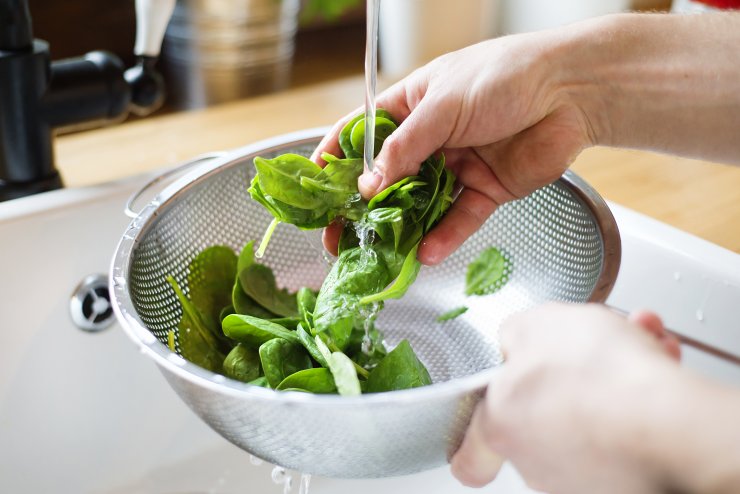
Washing delicious basil
Basil is a surprisingly powerful herb, health-wise, for such a seemingly routine plant! It’s a nutritional powerhouse with vitamins A, C, K, B6, iron, calcium, potassium, and tryptophan—and with all its nutrient density, basil can be part of a diet that helps you reduce chronic inflammation.
Many of the essential volatile oils in basil leaves may provide healthful benefits, such as:
Anti-inflammatory agent
Basil’s powerful essential oils—including eugenol, citronellol, and linalool—help lower inflammation with enzyme-inhibiting properties. The anti-inflammatory properties of basil may help lower the risk of heart disease, rheumatoid arthritis, and inflammatory bowel conditions.
Digestive benefits
Basil can help improve your digestion by fortifying the digestive and nervous systems. Basil helps balance acid within your body and restores your body’s proper pH level—and it feeds healthy bacteria to your gut. Eating basil may help reduce bloating and water retention, too. And basil consumption can even stimulate loss of appetite and treat acid reflux.
Anti-bacterial properties
The flavonoids, including orientin and vicenin, found in basil provide protection from radiation and oxygen-based damage for your body’s cell structures and chromosomes. Basil is also proven to protect against unwanted bacterial growth with its volatile oils and may kill some food-borne bacteria. Adding fresh basil to your next homemade salad dressing will not only enhance the flavor of your fresh greens, but the basil may also help ensure that the fresh produce you consume is safer to eat.
Heart-health benefits
Basil is also a good source of magnesium, which promotes cardiovascular health by encouraging muscles and blood vessels to relax, improving blood flow and lessening the risk of irregular heart rhythms or spasms of the heart muscle or blood vessels. Basil is also a good source of beta-carotene, a powerful antioxidant that protects the lining of blood vessels and prevents free radicals from oxidizing cholesterol in the blood stream.
And finally, besides some traditional Chinese folk medicine promises of therapeutic benefits, basil has been found to repel mosquitoes and flies with the plant’s pungent smell—so surround your outdoor patio with an array of basil plants to help naturally guard against mosquitoes, flies, and other pests.
Bottom Line
While some further medical studies might be required to confirm certain health benefits of basil—and if you are taking blood-thinning drugs, you should consult your doctor about the potential adverse reaction of consuming foods rich in vitamin K that aid blood-clotting—eating basil is a great way to enjoy a natural herb that can improve the flavor and benefit of the food you eat.
Did you know that basil can be so beneficial and healthful? Please tell us about healthy ways you use basil.



